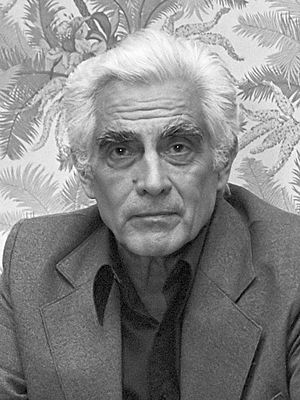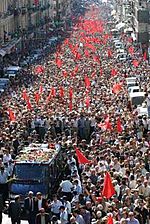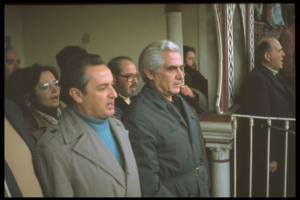Álvaro Cunhal facts for kids
Quick facts for kids
Álvaro Cunhal
|
|
|---|---|
 |
|
| Minister without Portfolio | |
| In office 16 May 1974 – 8 August 1975 |
|
| Prime Minister | Adelino da Palma Carlos Vasco Gonçalves |
| Preceded by | Office established |
| Succeeded by | Jorge Campinos |
| General Secretary of the Portuguese Communist Party | |
| In office 31 March 1961 – 5 December 1992 |
|
| Preceded by | Bento Gonçalves |
| Succeeded by | Carlos Carvalhas |
| Personal details | |
| Born |
Álvaro Barreirinhas Cunhal
10 November 1913 Coimbra, Portugal |
| Died | 13 June 2005 (aged 91) Lisbon, Portugal |
| Political party | Portuguese Communist Party |
| Domestic partner | Isaura Moreira (1960–1965) |
| Children | Ana Cunhal |
| Alma mater | University of Lisbon |
Álvaro Barreirinhas Cunhal (10 November 1913 – 13 June 2005) was an important Portuguese leader. He was a strong believer in communism. He was known for standing up against the Estado Novo, a strict government that ruled Portugal for many years.
Cunhal was the main leader, or secretary-general, of the Portuguese Communist Party (PCP) from 1961 to 1992. He was one of the European communist leaders who most supported the Soviet Union. He often agreed with the Soviet Union's decisions, even when they sent their army into Czechoslovakia in 1968.
Life of Álvaro Cunhal

Álvaro Cunhal was born in Coimbra, Portugal, in 1913. His father was a lawyer. His mother was a devoted Catholic.
Cunhal studied Law at the University of Lisbon. While there, he joined the Portuguese Communist Party in 1931. At that time, the party was not allowed by the government.
He first visited the Soviet Union in 1935. He became part of the party's main committee in 1936. His first arrest happened in 1937 when he was 23 years old.
After some time, he taught at a school in Lisbon. One of his students was Mário Soares. Soares later became the President of Portugal. They would become political rivals after 1974.
From 1941 to 1949, Cunhal lived "underground." This means he was hiding from the government. He became the unofficial leader of the party during this time.
In 1949, the secret police, called the PIDE, arrested him. He stayed in prison for 11 years. In 1960, he made a famous escape from the Peniche prison.
In 1961, Cunhal became the official secretary-general of the party. This happened after the previous leader, Bento António Gonçalves, died in prison. Cunhal lived in exile in Moscow and Paris until 1974. His daughter, Ana Cunhal, was born in Moscow in 1960.
When the Carnation Revolution happened in April 1974, Cunhal returned to Portugal. The Communist Party was now legal. He led the party through the big political changes that followed the revolution.
He served as a Minister without Portfolio in several temporary governments. This meant he was a minister but didn't have a specific department. Some army officers who supported the Communist Party were powerful then. This led to accusations that the party was trying to take over the government using the military.
Cunhal was known for his firm stance. He often disagreed with the Socialist Party, led by Soares. This made it hard for the left-wing parties to work together.
Cunhal stepped down from his leadership role in 1992. Carlos Carvalhas took his place. However, Cunhal still had an important voice in the party. He always supported the party's traditional views.
He also shared a secret: he had been writing novels under the name Manuel Tiago. His drawings, made while he was in prison, were also published. He even translated King Lear by Shakespeare.
Álvaro Cunhal passed away in Lisbon in 2005. His funeral was attended by over 250,000 people.
Manuel Tiago's Fiction Works
Álvaro Cunhal was also a writer of stories. He used the pseudonym (a pen name) Manuel Tiago. He only admitted this in 1995. He also drew pictures for a book by Soeiro Pereira Gomes called Esteiros.
Here are some of the books he wrote as Manuel Tiago:
- Até Amanhã, Camaradas (This book was made into a TV series in 2005).
- Cinco Dias, Cinco Noites (This book was made into a film in 1996).
- A Estrela de Seis Pontas.
- A Casa de Eulália.
- Lutas e Vidas. Um conto.
- Os Corrécios e outros Contos.
- Um Risco na Areia.
- Fronteiras.
See also
 In Spanish: Álvaro Cunhal para niños
In Spanish: Álvaro Cunhal para niños
- Armed Revolutionary Action
 | Ernest Everett Just |
 | Mary Jackson |
 | Emmett Chappelle |
 | Marie Maynard Daly |


